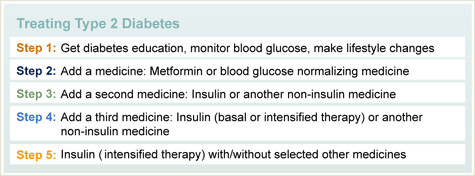Type 2 diabetes is caused by two problems:
- Resistance to the action of insulin
- An inability to make enough insulin to overcome that resistance
So, type 2 diabetes treatment focuses on ways to control the blood sugar, lower the insulin resistance, and increase insulin levels. Every treatment plan usually starts with a healthy diet, losing extra weight and staying active. If this doesn’t keep the blood sugar on target, then your provider will prescribe medicine.

These are pills and non-insulin medicines routinely used to treat type 2 diabetes:
- Metformin:
Pills that reduce sugar production from the liver - Thiazolidinediones (glitazones):
Pills that enhance sugar removal from the blood stream - Insulin releasing pills (secretagogues):
Pills that increase insulin release from the pancreas - Starch blockers:
Pills that slow starch (sugar) absorption from the gut - Incretin based therapies:
Pills and injections that reduce sugar production in the liver and slow the absorption of food - Non-insulin Treatment for Type 2 Diabetes –
Amylin analogs:
Injections that reduce sugar production in the liver and slow the absorption of food
View a Table of Non-Insulin Medications that summarizes all the oral pills and non insulin, injected therapies including the strength of the medication, doses and side effects.
Insulin also may be used to treat type 2 diabetes:
- Insulin Therapy:
Injections that raise your insulin level
